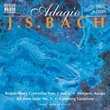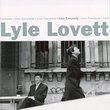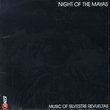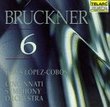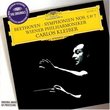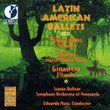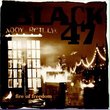| All Artists: Malcolm Arnold, Malcolm / Penny, Andrew Arnold, Andrew Penny, Irish National Symphony Orchestra, National Symphony Orchestra of Ireland Title: Arnold: Symphony No. 9 Members Wishing: 0 Total Copies: 0 Label: © 1996 HNH International Ltd. / Naxos Original Release Date: 1/1/1996 Re-Release Date: 4/23/1996 Genres: Special Interest, Classical Styles: Historical Periods, Modern, 20th, & 21st Century, Symphonies Number of Discs: 1 SwapaCD Credits: 1 UPC: 730099454025 |
Search - Malcolm Arnold, Malcolm / Penny, Andrew Arnold, Andrew Penny :: Arnold: Symphony No. 9
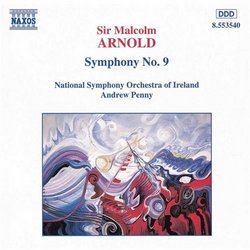 | Malcolm Arnold, Malcolm / Penny, Andrew Arnold, Andrew Penny Arnold: Symphony No. 9 Genres: Special Interest, Classical
|
Larger Image |
CD DetailsSimilar CDs
Similarly Requested CDs
|
CD ReviewsOne of the greatest symphonies of the 20th century. Augustus Caesar, Ph.D. | Eugene, Oregon United States | 05/01/2004 (5 out of 5 stars) "Malcolm Arnold (b. 1921) is one of Britain's most popular and distinguished composers. Best known in the US for his "Bridge on the River Kwai" soundtrack, he has written distinguished works in virtually every serious genre except opera. Unfortunately, Arnold's personal life has often proved calamitous, and in 1981, he entered a prolonged depression that lasted five years. His Ninth Symphony, written in 1986 as the composer emerged from the darkest period of his tumultuous life, is a testament to his experience and the fitting summation to his work as a symphonic composer. The Ninth is an extraordinary accomplishment on every level. It is melodically rich, harmonically adventurous, brilliant in its conception, and superb in its scoring. Nowhere else does Arnold's talent as an orchestrator shine through with more assurance. To me, this is one of the most accomplished symphonies of the 20th century.From its deceptively bright opening through the anguished groaning basses of the amazing, massive lento last movement, this is the rare symphony that is able to maintain the listener's rapt attention from the first note to the last. Though he covers many moods in the course of four movements, Arnold's overriding impression is one of despair. This is more than understandable, given the circumstances in which it was written. The finale's last measures, in which an ascending melody lifts the music from dirge-like agony to a sudden and radiant D major, constitute a deeply satisfying conclusion. Like its creator, the symphony expresses pain, but ends with optimism. In this, it is much like life.I cannot recommend Arnold's Ninth Symphony enough, particularly in this excellent recording, which was made in the presence of the composer. The final track is an illuminating ten-minute interview with Arnold himself, in which he discusses his work on the symphony and its personal meaning. Though he is now retired from composition, we can all be thankful for the many wonderful works he gave us--the greatest of which is this Ninth Symphony." Great symphony, great recording B. J. E. Swindell | Herts., UK | 06/21/2006 (5 out of 5 stars) "This symphony shows Malcolm Arnold in a new vein, a more serious, purposeful one to my mind. In his earlier symphonies there was much to be enjoyed, but at times there seemed to be an element of showmanship which almost distracted one from the musical argument, but not in this ninth symphony; here gravitas and reflection are the dominant elements. The music is focussed, the scoring economical and only occasionally does the full orchestra come into play; for much of the time the various instruments play only in small groups and combinations. The first movement begins quietly and smoothly and, to my mind, hints at Rawsthorne, with its dark undertones - in fact it is not until into the second minute that the characteristic arpeggios in the woodwinds make it clear that this is an Arnold symphony. The second movement is remarkable, the same theme repeated many times (~17) with relatively little variation notewise, but the orchestral colouring holds the attention so completely that each repetition seems fresh and a logical follow-on from what went before - only a master craftsman could bring it off. The scherzo is the most Arnold-of-old-like of the movements, but even here the brashness is held in check and the interplay between, say, the brass and the rest of the orchestra is more restrained and intense - an orchestral tour-de-force! And the finale - well, the long quiet passages almost outdo the finale of Vaughan Williams's 6th in meaning and tension, and the movement is around twice the length of VW's. Certainly there was a strong valedictory note permeating this movement in particular, and the whole symphony in general. Malcolm Arnold's ninth symphony is a very powerful musical statement. It's restraint and thoughtfulness, compared with his earlier symphonies, gives it a moving quality. One could listen, say, to Arnold's 5th. and come away thinking "well that was very jolly", but the 9th. is more likely to leave the listener deep in thought, aware that he/she has just heard the music of a genius. The interview at the end was interesting, but I got the impression that Andrew Penny was struggling at times to get a response out of the old man - he seemed almost to recall Ted Heath in one of his "silent" moods. And he seemed almost surprised that he was still around, but "there's life in the old dog yet". And 10+ years later he's still around. A lotta life in that old dog, it would seem!" Moving symphony, great recording J. Michael Kendrick | Wheaton, IL USA | 01/17/2004 (5 out of 5 stars) "Written in 1986, at the end of a long, bleak period in Arnold's personal life, this powerful symphony captures an extraordinary range of emotions. The elgaic, haunting final movement is particularly moving. As with the other symphonies in this cycle, Andrew Penny and the NSO of Ireland turn in a great performance"
|

 Track Listings (5) - Disc #1
Track Listings (5) - Disc #1